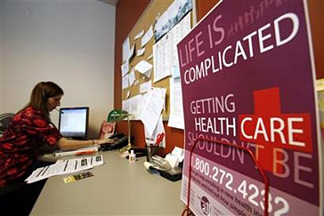 |
 |
 |
 Editorials | Issues | March 2007 Editorials | Issues | March 2007  
Healthcare for All Americans?
 Domenico Maceri - PVNN Domenico Maceri - PVNN


| | Hannah Frigand helps a caller with a health insurance question at the non-profit 'Healthcare For All' in Boston, Massachusetts. Nearly a year into its pioneering health-care law, Massachusetts offers both a way forward and a warning that puts the state at the center of a growing national debate over extending health care to millions of Americans. (Brian Snyder/Reuters) |
Capitalism has created a high standard of living in many western countries, but when you think of healthcare in the US, the result has been very different. It is estimated that 47 million Americans do not have health insurance, which in the US is dominated by private companies whose main goal is profits.

Given the rising costs of healthcare for those who are lucky enough to have it, some serious talk has been going on about a system that will cost less and cover everyone, as is the case in Canada and most of Western Europe.

People in the US are beginning to talk about healthcare as a right for everyone instead of a privilege reserved only for those who can afford it. But restructuring the healthcare system in the US is not going to be easy because the insurance lobby is extremely powerful. Yet, it appears that something will be done for the usual motivation of capitalism profits.

The continuing rising costs of healthcare are beginning to have an impact on major and minor companies which have traditionally paid the healthcare costs for their employees. According to some studies, the rising costs of healthcare will eliminate corporate profits by the year 2008.

In spite of the rising expenditures the results are not encouraging. A New York Times article compared the healthcare expenditure in the US with those of Canada, Australia, France, and Great Britain using data provided by the Organization for Economic Cooperation and Development.

The US spends $6,102 dollars for every citizen yearly for healthcare, twice the amount of the countries in the study. One would think that the extra money would provide better results, but that is not the case.

The infant mortality rate in the US is the highest among the countries in consideration (6.9 per 1,000 births in US, 5.9 in Great Britain). In so far as life expectancy its 77.5 years in the US, the lowest of the group (the highest is in Australia, 80.6 years.)

Where does the money go? Some of it pays for the care of the 47 million without health insurance who as a last resort end up in emergency centers and cannot be refused care.

It is estimated that 31% of health expenditure goes for paperwork since each insurance company uses different forms and personnel must be hired to process them. Another estimate says that if a single payer existed the savings would be enough to cover the 47 million who now dont have insurance.

The combination of costs to employers and employees with healthcare insurance will push politicians to act. Arnold Schwarzenegger, governor of California, introduced a proposal that would enable every Californian to buy health insurance. The proposal follows what has already happened in Massachusetts.

At the national level the midterm elections will probably clear the path for action since the Democrats have regained control of both the House and the Senate. And some presidential candidates, such as John Edwards, have made universal health insurance part of their platform.

However, changes to move to a single payer will not come about easily. Insurance companies have very powerful lobbies and in spite of the fact that Republicans, their major supporters, lost the midterm elections, they can still count on the White House as an ally. Democrats will have to approve healthcare programs with 2/3 majorities or face a likely presidential veto.

Of course, things have changed now. After a decade of Republican dominance at the legislative and executive branches of government, Americans have indicated a shift to the left as can be seen from the midterm election results.

In addition, the disastrous Iraq war has probably convinced at least a majority of Americans that government can and must play an active role in domestic issues, particularly in healthcare. Government may not turn out to be a savior in terms of healthcare but the solution seems to point to the Euro-Canadian style of system.
 Domenico Maceri, PhD, UC Santa Barbara, teaches foreign languages at Allan Hancock College in Santa Maria, CA. He is the author of a book on Pirandello, one on Spanish grammar, and another on Italian grammar. He has also published a number of articles in newspapers and magazines around the world, some of which have won awards from the National Association of Hispanic Publications. Domenico Maceri, PhD, UC Santa Barbara, teaches foreign languages at Allan Hancock College in Santa Maria, CA. He is the author of a book on Pirandello, one on Spanish grammar, and another on Italian grammar. He has also published a number of articles in newspapers and magazines around the world, some of which have won awards from the National Association of Hispanic Publications.

Click HERE for more articles by Domenico Maceri. | 
 | |
 |



